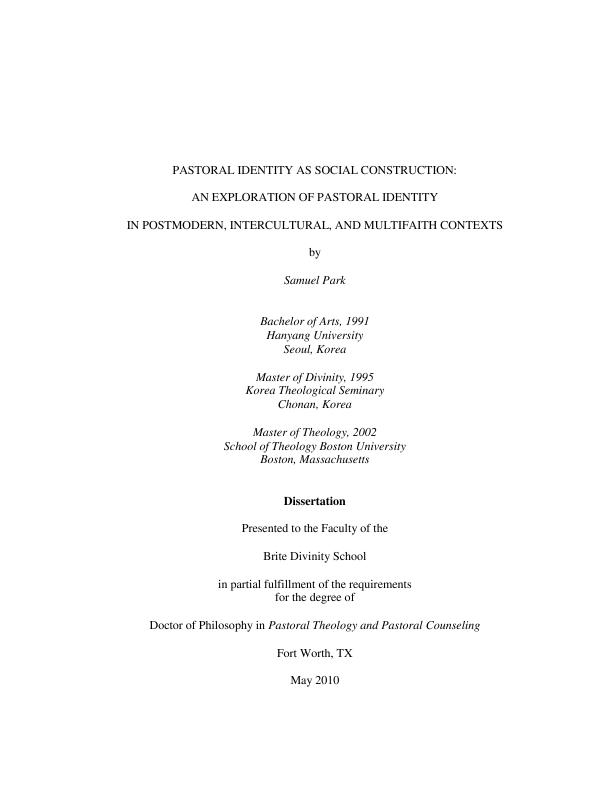Pastoral identity as social construction: an exploration of pastoral identity in postmodern, intercultural, and multifaith contextsShow full item record
| Title | Pastoral identity as social construction: an exploration of pastoral identity in postmodern, intercultural, and multifaith contexts |
|---|---|
| Author | Park, Samuel |
| Date | 2010 |
| Genre | Dissertation |
| Degree | Doctor of Philosophy |
| Abstract | How do chaplains and pastoral counselors form their identities as "pastoral" caregivers in challenging clinical contexts such as institutional, interdisciplinary, postmodern, inter-cultural, and multi-faith work environments? Previous studies on pastoral identity have focused on an individual interiority of pastoral practitioners and have emphasized mainly the caregivers' perceptions and practices from a developmental and training perspective. Grounded in an empirical study of active pastoral care providers, this project presents pastoral identity as a relational and interactional property, socially constructed among pastoral care partners, culture, and God.^Findings of the empirical study support contemporary theological and social psychological discourses: identity is embedded in and embodied by relationships.^Empirical data from my study suggest that pastoral caregivers construct their pastoral identity in the midst of interacting with their clients and that, within this interaction, both caregivers and seekers find their renewed identities. From a symbolic interactionist perspective, social interactors (here caregivers and care-seekers), as self-reflexive agents, do social acts (bringing problems and seeking to find a solution) by interpreting each other's symbolic meanings of the acts (care-giving and receiving). In these social interactions, caregivers and seekers see themselves in the others and find their identities through their relationships with the others.^Moreover, a theological perspective of perichoresis--usually known as a trinitarian concept that explains both the oneness and the diversity of the Trinity--sheds light on such interactional and constructive identity that embraces both self and community within pastoral care-giving.^Informed by a recent social psychological approach to identity, this project explores the possibility for an interactional, intersubjective, and constructive paradigm of pastoral identity. Adapting to and working to change contemporary cultural contexts and structural powers, pastoral caregivers construct their identities interactionally with care-seekers by interweaving God's providential calling and clients' specific callings for help. Such constructions result in an embracing of multiple pastoral identities, including spiritual representatives, fellow humans, pastors, and divine partakers.^The data that form the basis of this study consist of 20 interviews and 63 surveys of chaplains and pastoral counselors and reflective memos of the collected information. The strategies of grounded theory provided the methods for collecting and analyzing the data.^Furthermore, the theological perspective of perichoresis helps us look at pastoral care-giving as agentive self-enhancing and other-containing communion that caregivers and seekers form in their relationships and that allows the care partners to construct their unique identities. Accordingly, this dissertation redefines pastoral identity as a property of interaction among the caregiver, care-seekers, context, and God--a pastoral identity the interactions and relationships continuously transform. |
| Link | https://repository.tcu.edu/handle/116099117/4260 |
| Department | Brite Divinity School |
| Advisor | Neuger, Christie Cozad |
Files in this item
This item appears in the following Collection(s)
- Doctoral Dissertations [1523]
© TCU Library 2015 | Contact Special Collections |
HTML Sitemap



